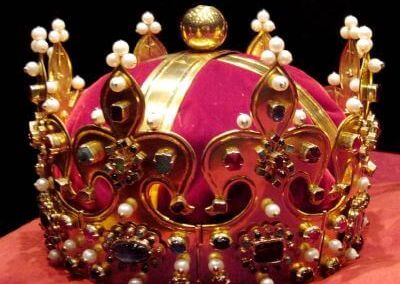Meeting the King
 In an ideal world, our leaders would be qualified, competent, and benevolent. If we could find such a person, we certainly would want him or her to rule for life, providing for our common needs, protecting us from danger, and helping us to flourish.
In an ideal world, our leaders would be qualified, competent, and benevolent. If we could find such a person, we certainly would want him or her to rule for life, providing for our common needs, protecting us from danger, and helping us to flourish.
Now imagine living in a country like that. Once a year, the King comes for a visit. He has placed relatively limited demands upon you, while providing you with a tremendous bounty. And you know that you have failed to live up to his modest expectation — yet despite all that, you also know that the King cares about you personally, wants you to succeed, and hopes that you will take advantage of his visit as an opportunity to renew your commitment to growth and development under his rule. What would you do to prepare for his visit? And how would you behave in front of the King?
Certainly, it would be a solemn occasion, with all the majesty befitting a royal visit. You would wear special clothes, polish the silverware and hang decorative curtains, and prepare banquets in his honor. Yet at the same time, you would celebrate his benevolent rule, knowing that he would judge your actions with mercy, and give you the opportunity to do better. And, of course, you would commit yourself to doing precisely that, so that next year his royal visit could be a celebration of your success.
This is perhaps a brief encapsulation of Rosh Hashanah, the Jewish New Year.
We are ruled by the King of Kings, Creator of the Universe. He sees past, present, and future. He knows what will work and what will fail, and knows how to lead us. And he hopes to see us succeed under His rule.
Each year, He judges the world — and gives us the opportunity to judge ourselves, to see our failings, and to look for ways to do better. We can clear out bad habits and replace them with better ones, in order to grow in our commitment to Judaism and Jewish ethics.
Our prayers are serious, and somber. We speak in our special Musaf prayer of his Kingship, his Remembrance of all things, and the need to cry out to him and to arouse others with the sound of the Shofar. Yet we know that He will not only judge us fairly, but mercifully, giving us a special opportunity to correct ourselves and do better.
Rosh Hashanah initiates what are called the “Ten Days of Repentance,” a special opportunity to celebrate with our King when He is close to us, and grow in our efforts to remain close to Him throughout the coming year.
Learn About the Holiday
Meeting the King
Rosh Hashanah presents a special opportunity to celebrate with our King when He is close to us, and grow in our efforts to remain close to Him throughout the coming year.
Why We Blow the Shofar
Why do Jews all around the world blow the Shofar? What is so special about blowing the Shofar and not another horn? Why on Rosh HaShana?
Rosh Hashanah Perspectives
A wide variety of perspectives into the depth and meaning of this monumental holiday..



